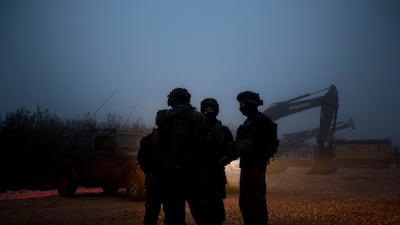A high-ranking member of the Lebanese armed forces colluded with Hezbollah's efforts to build an underground tunnel network that could serve as a staging point for an invasion of Israel, the latter's UN ambassador alleged on Wednesday.
The comments from Danny Danon in New York follow confirmation from the UN peacekeeping force (Unifil) two days ago that four tunnels had been found close to Lebanon's southern border with Israel.
On December 4, the Israeli military announced operation "Northern Shield" to destroy tunnels it said had been dug by Hezbollah under the border.
Mr Danon, however, went further, displaying a photograph of a tunnel system, captioned “Hezbollah's 'Conquering the Galilee' Plan”, in a theatrical presentation reminiscent of those delivered by his prime minister Benjamin Netanyahu.
He warned that Israel would respond militarily if threatened again and said the Lebanese military was complicit in Hezbollah's plans.
“The situation is not good, we need to see a change,” he said before the UN Security Council met to discuss Israel's allegations.
“Israel even revealed to Unifil that a high-ranking member of the Lebanese armed forces actively cooperates with Hezbollah.
“When Unifil told the Lebanese Army about the tunnels the Lebanese army sent the information straight to Hezbollah, who then sealed the tunnels to destroy the evidence.
“It is part of Hezbollah's plan to invade the Galilee, our northern part, and destroy Israel.”
__________________
Read more:
Lebanon: Government formation is imminent, officials say
Moody's revises Lebanon's rating to negative on higher geopolitical risks
Lebanon's private sector growth worsens at slower rate in November
__________________
Playing archive footage of a speech by Hezbollah’s secretive leader Hassan Nasrallah in 2013, Mr Danon said the plan to invade was long in the making. In the video, Nasrallah, who has not in the past fortnight spoken about the tunnels, appeared to suggest that Hezbollah fighters should prepare for an operation to conquer the Galilee, a region in northern Israel that borders Lebanon.
“What you are seeing is Hezbollah's conquest of the Galilee battle plan in action. This is just the ground component, or offensive that will use Hezbollah's arsenal of over 100,000 rockets and missiles to strike all of Israel,” Mr Danon said.
“Make no mistake, if Hezbollah forces our hand we will act swiftly and we will do it with full force.”
At Wednesday's meeting, several members of the Security Council condemned Hezbollah's actions but also criticised Israel for repeated breaches of Lebanese sovereign territory and airspace.
Amal Mudallali, Lebanon's permanent representative to the UN, said the country was committed to its international obligations.
"Unfortunately, it seems my country is condemned to repeated threats. Lebanon has witnessed four Israeli invasions in the past 40 years," she said. "Today we are witnessing another volatile situation concerning the tunnels. Lebanon has said repeatedly at the highest levels that we are not interested in a conflict."
Israel's latest allegations coincide with Lebanon nearing formation of a new government, seven months after elections. The US warned late on Tuesday that the political process could see Hezbollah gaining ever more control in how the country is run.
"We continue to have deep concerns regarding Hezbollah's growing political power inside Lebanon," a State Department official told Reuters. "We are concerned about the efforts of Hezbollah's political allies that provide it with top cover and a veneer of legitimacy.”
Hezbollah, designated as a foreign terrorist organisation by the US since 1997, is expected to receive three ministries in the next Lebanese Cabinet, including the health ministry. America is the biggest backer of the Lebanese army, a sovereign entity, providing more than $1.5 billion (Dh5.5bn) in support since 2006.
However the army's resources are dwarfed by Hezbollah's missile cache and heavy funding from Iran, its Shiite backer. Mr Danon echoed the US comments, saying he “believed Lebanon had taken over part of the government of Lebanon” and that the UN had to send a signal of disapproval, such as classifying the group as a terrorist entity in the same manner as the US State Department.

